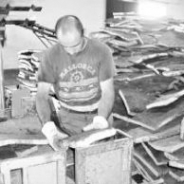
MORE THAN 30,000 TONSThe cork industry has exceeded 30,000 tons for the first time in the decade.The cork industry in Extremadura is on the point of closing a decorking campaign which, according to the forecasts made by the Institute for Cork, Wood and Coal of Extremadura (Ilprocor), will beat production records of the last decade. While official figures are still awaited, the harvest could reach or exceed 31,000 tons. “For the first time in the last seven or eight years the campaign is being carried out in the most favourable way. We are going to achieve the biggest harvest this century and even of part of the 90s, approximately between 30,000 and 31,000 tons of cork, with which we exceed by some way the average production of 25,000 we have had in recent years”, explains Miguel Elena, director of Iprocor. Among the causes, he points out, is the fact that producers have taken the harvest of 2006 and important remainders from the two previous years. To this is added the high quality of the extractions made. “There has been a further gain in calibre, because there were significant parts of the surface-areas decorked of each cork tree which were a year older than what was due for this campaign”, he indicated. The industry will also benefit from stability of prices, which will stay at the levels of last year: around 45 euros per hundred-weight for the inferior class, 70 for the intermediate class and over 90 for the select class. For the moment Iprocor considers that the drought suffered last year and which is being repeated this summer is not affecting production or quality. Miguel Elena states that “it is a phenomenon which should not have an effect on the trees, as for that it would have to last two or three years, and what we have at the moment is a drought lasting months. The effects of the lack of rain are not preceptible, although there could be problems if the situation goes on too long”. Another of the threats to the industry is in the area of bottle stoppers. Plastic and aluminium have taken some of the market away from cork, although Miguel Elena trusts it will soon recover. “The problem is that it is cheaper to make a product with oil than it is to use another prepared by craftsmanship. It is a question of saving, but everything depends on trends and we have to try to correct this tendency to replace cork with other materials. The industry is reacting and plastic is losing ground slightly”, he explains. |
| Cork specialists - Cork treatment - Cork-2000 | website map |
CA ES
ES EN
EN FR
FR
|
 |
 |
 |
 |
 |

